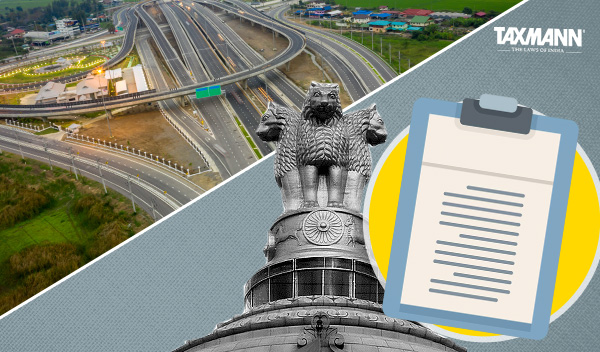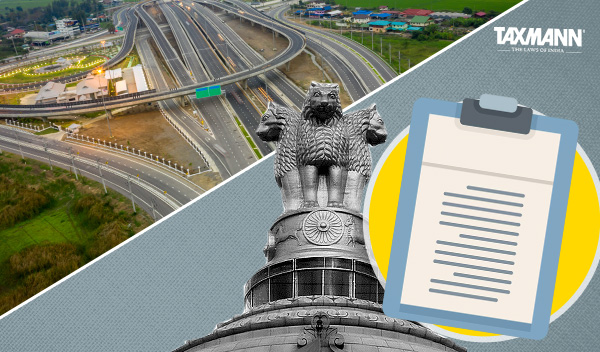
1. Question
InfraBuild Limited (hereinafter referred as “the Company”) entered into a 20-year service concession arrangement with the State Government (hereinafter referred as “the Grantor”) to design, construct, operate, and maintain a new six-lane highway connecting two industrial hubs. The project is divided into two phases: a three-year construction period and a subsequent 17-year operation and maintenance period, after which the highway will be handed back to the Grantor in a pre-agreed condition.
As per the agreement, the Company will finance and construct the highway using its own resources and debt facilities. In return, the Grantor will provide compensation through a hybrid mechanism:
(a) Guaranteed Annual Payment – The Grantor commits to pay the Company Rs. 200 crores annually throughout the operation period, regardless of traffic volumes. This ensures minimum assured cash inflows to cover financing and operating costs.
(b) Right to Collect User Charges – In addition to the guaranteed payment, the Company is granted the right to levy toll charges directly from vehicles using the highway during the concession period. These toll rates are regulated by the Grantor but collected by the Company. The actual revenue from tolls will depend on traffic volumes and demand fluctuations, exposing the Company to usage risk.
During the construction phase, the Company is responsible for completing the highway within the agreed timeline and technical specifications. Upon completion, the operation phase begins, where the Company earns cash inflows both from the Grantor’s guaranteed annual payments and from toll collections.At the end of the concession period, ownership of the highway will revert back to the Grantor, with the Company having no residual rights over the asset.
Since the compensation mechanism comprises both guaranteed payments from the Grantor and toll collections from users, the management has sought advice from the consultant on how to account for revenue recognition. Specifically, guidance is required on recognizing revenue from construction services during the building phase, as well as revenue from operation and maintenance services over the concession period, in accordance with the requirements of the applicable standard.
2. Relevant provision
Ind AS 115: Revenue from contracts with customers
Para 31- An entity shall recognise revenue when (or as) the entity satisfies a performance obligation by transferring a promised good or service (i.e. an asset) to a customer. An asset is transferred when (or as) the customer obtains control of that asset.
Para 35- An entity transfers control of a good or service over time and, therefore, satisfies a performance obligation and recognises revenue over time, if one of the following criteria is met:
(a) the customer simultaneously receives and consumes the benefits provided by the entity’s performance as the entity performs (see paragraphs B3-B4);
(b) the entity’s performance creates or enhances an asset (for example, work in progress) that the customer controls as the asset is created or enhanced (see paragraph B5); or
(c) the entity’s performance does not create an asset with an alternative use to the entity (see paragraph 36) and the entity has an enforceable right to payment for performance completed to date (see paragraph 37).
3. Appendix D
Para 11- Infrastructure within the scope of this Appendix shall not be recognised as property, plant and equipment of the operator because the contractual service arrangement does not convey the right to control the use of the public service infrastructure to the operator. The operator has access to operate the infrastructure to provide the public service on behalf of the grantor in accordance with the terms specified in the contract.
Para 12- Under the terms of contractual arrangements within the scope of this Appendix, the operator acts as a service provider. The operator constructs or upgrades infrastructure (construction or upgrade services) used to provide a public service and operates and maintains that infrastructure (operation services) for a specified period of time.
Para 13- The operator shall recognise and measure revenue in accordance with Ind AS 115 for the services it performs. The nature of the consideration determines its subsequent accounting treatment. The subsequent accounting for consideration received as a financial asset and as an intangible asset is detailed in paragraphs 23-26 of this Appendix.
Para 15- If the operator provides construction or upgrade services the consideration received or receivable by the operator shall be recognised in accordance with Ind AS 115. The consideration may be rights to:
(a) a financial asset, or
(b) an intangible asset.
Click Here To Read The Full Story
The post Revenue Recognition In Highway Development Under Ind AS 115 appeared first on Taxmann Blog.
